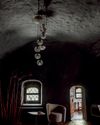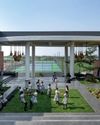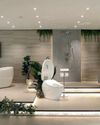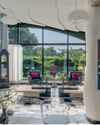
XISUI Design has designed a thin-shell metal woven pavilion in Hefei City, Anhui Province, China. Situated over a pool, it serves as a resting place offering shelter from wind and sun, while still inviting natural light to penetrate its interior.
This pavilion introduces a novel approach to digital metal construction. Its segmented metal shell is inspired by the bionic weaving appearance of birds’ nests, and the structural principles of arched force transmission found in eggshells, which the team has studied in depth. The design features an integrated ultra-thin shell and a centripetal dome, aimed at fostering a pure and serene experience that promotes inner contemplation and peace.
Spanning 11 meters over water, the pavilion is constructed utilising minimal materials and manual labour to generate a unique architectural space. The project explores new possibilities in design, engineering, and fabrication through continuous computational testing with interdisciplinary teams.
Here are 4 key reasons why this project shatters the traditional norms of design
1. INTEGRATED STRUCTURAL SKIN – THE SHELL WORKS AS A STRUCTURE
Typically, a pavilion with an 11x8 meter span requires a substantial supporting framework. This project challenges that convention with a keelfree design, realised through a doubly curved structure that uses only a thin shell surface for load-bearing.
Wind and gravity load calculations showed that just 2 layers of 2.5 mm thick metal plate segments were sufficient to achieve a span 4,400 times their thickness. As an effective structural form, the shell efficiently distributes loads, using principles similar to ancient vaulted buildings and natural bird eggshells. This design ensures both stability and efficiency, minimising material usage while maintaining the pavilion’s aesthetic integrity and elegance.
2. EASY-TO-BUILD DIGITAL CONSTRUCTION
Diese Geschichte stammt aus der September 2024-Ausgabe von Architect and Interiors India.
Starten Sie Ihre 7-tägige kostenlose Testversion von Magzter GOLD, um auf Tausende kuratierte Premium-Storys sowie über 8.000 Zeitschriften und Zeitungen zuzugreifen.
Bereits Abonnent ? Anmelden
Diese Geschichte stammt aus der September 2024-Ausgabe von Architect and Interiors India.
Starten Sie Ihre 7-tägige kostenlose Testversion von Magzter GOLD, um auf Tausende kuratierte Premium-Storys sowie über 8.000 Zeitschriften und Zeitungen zuzugreifen.
Bereits Abonnent? Anmelden

REVITALISING HISTORY
The transformation of the Chambers of Khamovnaya Sloboda into a beautiful cultural project is indeed awe-inspiring.

DESIGNING FOR LEARNING
The Basil Woods International School, Hyderabad, designed by Architecture Dialogue is a beautiful example of how design can address the challenges of a site.

THE BATH WAY
New age sanitaryware is all things innovative, design forward, hygienic, and comfortable to make bathrooms functional as well as aesthetic.

BREATHING LIFE
Studio Swatp transforms a historic Alibaug wada into a vibrant holiday retreat.

KNOCKOUT KITCHENS
The kitchen continues to be the heart of modern living spaces, with trends emphasising a seamless blend of innovation, functionality, and aesthetics.

The ROYAL DEN
Harkaran Singh Boparai, Founder and Principal Architect, Harkaran Boparai Studio (HBS), takes us through his regal atelier in the heart of Delhi and the journey that led to it.

SCULPTING FLUIDITY
The architecture of The Liquescent House by Shaili Banker Architects displays a language of organic fluidity.

DESIGN DEBATE NEW IDEAS SET SAIL IN SCENIC GOA
Replete with Portuguese vibes and picturesque sites, the October Edition of the Design Debate held in Goa was an exceptionally intriguing one.

FENESTRATION FOR VILLAS
In contemporary villa architecture, the use of new-age materials in windows and fenestration is driven by the need for durability, sustainability, and sleek design.

BOLD AND ARTISTIC
Bengaluru’s Reservoire introduces a fresh narrative to the city’s social landscape, where art, nature, and architecture converge seamlessly.